Rolf Potts's Blog, page 71
January 7, 2013
Culture shock during long term travel
Vagablogging :: Rolf Potts Vagabonding Blog
So – you’ve decided to take off for an extended tour. What now?
Most of us who have made the difficult decision to exchange what’s expected for a life on the road have visions of rainbows, gumdrops, and puppy dog tails. We may even expect grueling days, brutal weather, and everything going wrong. What we don’t expect to experience is culture shock.
Sure, if we travel internationally we expect a bit of culture shock as we adapt to the new culture surrounding us, but we don’t expect culture shock as it pertains to our journey itself. And yet, it’s real. Whether you are planning to tour the world by bicycle, sailboat, or train, you will go through the stages of culture shock as you adapt to your new lifestyle.
Nancy Sathre-Vogel is an author, motivational speaker, and blogger at www.familyonbikes.org. She is a long-term teacher who left it all behind to ride her bike from Alaska to Argentina with her husband and children. Now she’s living in Idaho writing and playing with beads.
Stages of Culture Shock
Stage 1: You will go through a honeymoon period the first few weeks of your journey. You look at the world through rose-colored glasses and everything is good. Life is as grand as it gets. You have left it all behind and are moving on to new adventures and experiences. Sure, you expected all those aches and pains as your body discovers muscles it never knew existed, and you expected to be exhausted in the evenings. But that’s all just part of the adventure!
Stage 2: A few weeks into your trip, reality hits. You’re tired. Your brain hasn’t quite figured out how to keep up with all the stimuli coming in and you’re mentally fried and physically exhausted. You’ve been pushing yourself hard, and now it all comes crashing down. The thought of setting up the tent one more time is nearly unbearable, and squatting around the stove to cook dinner is too much. Life is tough and the grass is greener back home. You long for the predictability of life back home – knowing you had a soft bed every night, a warm shower every morning, and a job to fill your days. Basically – life sucks.
Stage 3: You can see the light at the end of the tunnel. You aren’t there yet, but you can tell there is a little glimmer way down there somewhere. The overwhelming weight of the world has passed on and you are hopeful that maybe you can do this after all. You’ve figured out what kind of routine works for you, and your body adapts to the new demands placed upon it. Don’t get me wrong – life isn’t a bowl of cherries yet, but you begin to feel that it may be – someday.
Stage 4: You’ve finally realized the grass isn’t greener on either side of the fence – just a different shade of green. You’ve successfully adapted to life on the road and are happy with your decision. You know there are pros and cons of both lifestyles, and have chosen this one for now. The old way of life isn’t bad, and this new one isn’t perfect, but you can live with that. You’ve adapted.
Original article can be found here: Culture shock during long term travel
Conned: how to avoid common tourist scams
Vagablogging :: Rolf Potts Vagabonding Blog

A fool and his money. Photo: David Goehring / Flickr
Interacting with locals is one of the highlights of travel. On the flip side, the worst is running into local con artists who treat travelers like they’re walking ATM machines. Here’s a great post off The View from the Wing blog: Common tourist scams and how to avoid them. Also read the comments by the street-smart readers. For more, you can check out this extensive article on Wikitravel about common scams.
The basic rule of thumb is that if a person approaches you first, assume it’s a scam. Also any distractions, like someone bumping into you, falling in front of you, dropping something in front of you or on you (e.g. bird poop), there’s a million variations. If you’re a guy, be wary of any good-looking women who approach you and want you to take them to a bar they’ve already picked out.
I once got scammed in Paris. I was at a train station and needed to take a train to the airport. Had some trouble with the self-serve ticket machine. A fast-talking African guy said I was doing it wrong. He whipped out a card, put it in the machine and grabbed a ticket and gave it me. Then demanded some Euros. Like an idiot, I paid him. Of course, he had given me an ordinary subway ticket, not the RER commuter train ticket that goes to the airport. By the time I looked up, he was gone.
Other scams I’ve encountered are fake art students in Beijing, China and Yogyakarta, Indonesia. Luckily, I didn’t fall for their tricks. Overall, I ran into scams more often in Europe than Asia. My guess is that my Asian appearance makes locals think I’m a fellow resident, rather than a traveler.
One downside is that you can be overly suspicious and offend people. The one time that’s happened to me was in Burma (a.k.a Myanmar). I was in Mandalay, and trying to find a pharmacy shop. My hotel had given me the address but I got lost. An old man walked up to me and asked in English where I was going. I ignored him and kept walking. Eventually I realized I’d walked past the address and had to back-track. Came across the old man again and found the pharmacy. I apologized to him, but that just made him more angry. “Why you say ‘sorry’ now?!” he said. He told the pharmacy clerk how rude I’d been, while I was paying for the medicine. The clerk pretended not to hear, but I felt two inches tall at that moment.
To get more positive, the two places where I’ve only positive experiences with locals approaching me was Japan and Taiwan. Especially Taiwan, super-friendly people of all ages love to talk and meet you. Coming from scam-heavy places like China or Thailand, the overt gregariousness of Taiwanese can feel off-putting and suspicious. The only scammers I’ve run into in Taiwan were the bosses of the ESL English cram schools.
Have you been scammed? Please share your stories in the comments so other readers can avoid getting tricked.
Original article can be found here: Conned: how to avoid common tourist scams
January 6, 2013
Boris Groys on the complicated dynamic of hosts and guests
Vagablogging :: Rolf Potts Vagabonding Blog
“According to Kant sublimity lies not in ‘anything in nature’ but in the ‘capacity we have within us’ to judge and enjoy without fear the very things that threaten us. Hence the subject of Kant’s infinite ideas of reason is the tourist who repeatedly embarks on journeys in search of the extraordinary of enormity and danger in order to confirm his own superiority and sublimity in regard to nature. But in another section of this treatise Kant also points out that, for instance, the inhabitants of the Alps, who have spent their entire lives in the mountains, by no means regard them as sublime and ‘without hesitation’ consider ‘all worshippers of icy peaks to be fools.’ Indeed, in Kant’s age the romantic tourist’s gaze still differed radically from that of the mountain dweller. With his globalized gaze the tourist views the figure of the Swiss peasant, for instance, as a feature of the landscape — and thereby does not disturb him. To the Swiss peasant kept busy by and taking care of his immediate surroundings the romantic tourist is simply a fool and an idiot he is unable to take seriously. But in the meantime, as we well know, this situation has again completely changed. Even though the inhabitants of any particular region might still regard internationally roaming tourists as fools, nonetheless they increasingly sense the need — no doubt for economic reasons — to assimilate the globalized gaze pointed at them and to adjust their own way of life to the aesthetic predilections of their visitors, the travelers and tourists. Besides which, mountain dwellers have now also started to travel and are becoming tourists too.”
–Boris Groys, “The City in the Age of Touristic Reproduction,” Art Power (2008)
Original article can be found here: Boris Groys on the complicated dynamic of hosts and guests
January 3, 2013
Best 10 travel Destinations for 2013
Vagablogging :: Rolf Potts Vagabonding Blog
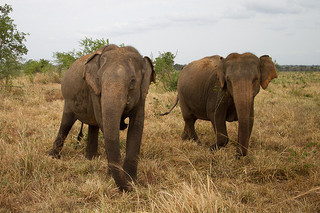
Credits: Flickr/BoJay
Lonely Planet has compiled his Top 10 Countries list for 2013: I always find amusing to check whether or not I have picked a “Top destination” for my next travel plans…
In 2013, Asia wins the golden medal with Sri Lanka: a country that, according to Lonely Planet, has finally healed the scars of a civil war and is ready to welcome visitors again thanks to cheap connecting flights from Asian travel hubs Bangkok and Kuala Lumpur.
Montenegro comes second: I have recently visited, and I definitely agree with the nomination. The quality of the tourist infrastructure and the affordable prices make for great adventure between mountains and seaside.
South Korea wins the bronze thanks to its great opportunities for hiking and exploring the great outdoors.
The list goes on and you may see for yourself. Ecuador, Madagascar and Turkey are some of the other selected countries.
I was expecting to find Kyrgyzstan among the selected destinations: with the recent start of a visa-free regime for most nationalities, and having some of the most dramatic scenery in Central Asia, I kind of expected it to pop up in the list…
Do you agree with Lonely Planet? Can you recommend any other destination with a great potential for travel this year?
Original article can be found here: Best 10 travel Destinations for 2013
January 2, 2013
Vagablogging Field Report: piranha bites, bizarre landscapes, buses and battling bowel problems in Bolivia
Vagablogging :: Rolf Potts Vagabonding Blog
Cost: $20/day
What’s the strangest thing you’ve seen lately?
My good friend Alex was bitten by a piranha whilst attempting to swim with pink river dolphins outside of Rurrenabaque. Our guide had assured us that the alligators lining the rivers edge and the piranhas dwelling within the brown water wouldn’t bother us, because they were scared of the dolphins. One rogue fish, however found Alex’s fleshy thigh too enticing and decided to attach it’s toothy grin to him. He was left with a series of tooth marks and a good story to regale fellow travelers with. Unfortunately after telling his story and revealing his battle scar people were rather disappointed that there wasn’t a sizeable chunk of flesh missing. Our guide informed us after the incident that the attacker hadn’t been a piranha, but some form of sardine. We quickly established that our guide was wrong, because being bitten by a river sardine doesn’t make for nearly as good a story.
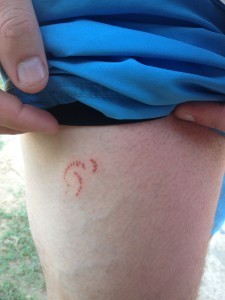
Piranha bite wound
Describe a typical day:
One day I may be cruising down a tributary of the Amazon spotting capybara, alligators and howler monkeys, whereas another day I might find myself strolling around seemingly infinite salt flats or racing down the so called death road astride a mountain bike. The diverse landscape has ensured that each day is quite unique. The most consistent element day to day has been the lack of consistency of my……..you know. My own experience as well as those relayed to me by other travellers indicates that diarrhea seems to be an inevitable side effect of travel in Bolivia.

Wildlife outside of Rurrenabaque
Describe an interesting conversation you had with a local:
During a tour of the Salar de Uyuni I met Rafa and his wife Lucia, a married couple from La Paz. They spoke passionately about their love of Quinoa, a grain-like crop grown and devoured throughout Bolivia. Their affection for the edible seeds was infectious and I became excited about the prospect of eating some myself. For the next meal our guide prepared some Quinoa and Rafa and Lucia smiled and looked at me expectantly as I took my first mouth full. It wasn’t bad, but it didn’t set my world alight and I failed to see how anyone could get so excited over it. Of course I didn’t convey these sentiments to the friendly Bolivianos awaiting my verdict but instead told them how delectable it was. This appeared to truly fill them with joy.
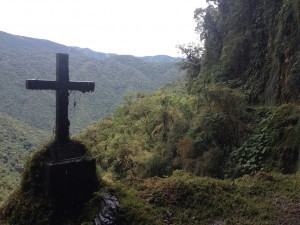
Along the aptly named death road
What do you like about where you are? Dislike?
Bolivia is a cheap country to travel through and the people, despite being amongst the poorest in South America, are extremely friendly and laid back. The incredible array of landscapes in such a small geographical space allows for a wealth of outdoor activities from extreme sports, such as mountaineering to more laid back pursuits like wildlife watching.
Personally my favourite part of Bolivia was the Salar de Uyuni and the surrounding landscape. Expansive, blinding white salt flats, pink and green salt lakes, curious rock formations and immense volcanoes somehow provide a bizarre 4 day jeep journey and somehow make geology interesting.
I disliked the havoc the local cuisine wreaked upon my bowels. The long, bumpy bus journeys were comfortably the worst I’ve experienced in South America and were made more trying by the lack of functioning toilet on board. As you can imagine having the squirts on an 8 hour bus ride with no toilet can be decidedly inconvenient.
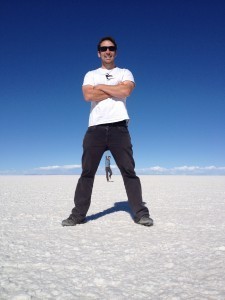
Salar de Uyuni gag shot
Describe a challenge you faced:
Finding food that I could trust or actually wanted to consume was difficult at times. Bolivianos love fried food, particularly chicken, which isn’t something that I’m ever going to be particularly excited about, however it appeared to be the only option in certain areas. At least the food doesn’t cost much.
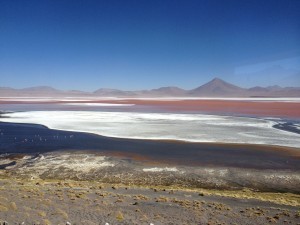
Bizarre lakes and volcanic landscape abound around Salar de Uyuni
What new lesson did you learn?
I love Bolivia and wish to return one day, however there is no denying that the quality of food in a destination makes a huge difference to my level of enjoyment and general mood. In fact, I’ve come to realize that I could happily travel somewhere just for the food alone.
Where next?
Northern Chile for a brief stint before returning to the USA
Original article can be found here: Vagablogging Field Report: piranha bites, bizarre landscapes, buses and battling bowel problems in Bolivia
Vagablogging Field Report: bizarre landscapes, buses and battling bowel problems in Bolivia
Vagablogging :: Rolf Potts Vagabonding Blog
Cost: $20/day
What’s the strangest thing you’ve seen lately?
My good friend Alex was bitten by a piranha whilst attempting to swim with pink river dolphins outside of Rurrenabaque. Our guide had assured us that the alligators lining the rivers edge and the piranhas dwelling within the brown water wouldn’t bother us, because they were scared of the dolphins. One rogue fish, however found Alex’s fleshy thigh too enticing and decided to attach it’s toothy grin to him. He was left with a series of tooth marks and a good story to regale fellow travelers with. Unfortunately after telling his story and revealing his battle scar people were rather disappointed that there wasn’t a sizeable chunk of flesh missing. Our guide informed us after the incident that the attacker hadn’t been a piranha, but some form of sardine. We quickly established that our guide was wrong, because being bitten by a river sardine doesn’t make for nearly as good a story so we omitted this bit of information from all future accounts of the incident.

Piranha bite wound
Describe a typical day:
One day I may be cruising down a tributary of the Amazon spotting capybara, alligators and howler monkeys, whereas another day I might find myself strolling around seemingly infinite salt flats or racing down the so called death road astride a mountain bike. The diverse landscape has ensured that each day is quite unique. The most consistent element day to day has been the lack of consistency of my……..you know. My own experience as well as those relayed to me by other travelers has revealed that diarrhea seems to be an inevitable side effect of travel in Bolivia.

Wildlife outside of Rurrenabaque
Describe an interesting conversation you had with a local:
During a tour of the Salar de Uyuni I met Rafa and his wife Lucia, a married couple from La Paz. They spoke passionately about their love of Quinoa, a grain-like crop grown and devoured throughout Bolivia. Their affection for the edible seeds was infectious and I became excited about the prospect of eating some myself. For the next meal our guide prepared some Quinoa and Rafa and Lucia smiled and looked at me expectantly as I took my first mouth full. It wasn’t bad, but it didn’t set my world alight and I failed to see how anyone could get so excited over it. Of course I didn’t convey these sentiments to the friendly Bolivianos awaiting my verdict but instead told them how delectable the Quinoa was. This appeared to fill them with joy.

Along the aptly named death road
What do you like about where you are? Dislike?
Bolivia is a cheap country to travel through and the people, despite being amongst the poorest in South America, are extremely friendly and laid back. The incredible array of landscapes in such a small geographical space allows for a wealth of outdoor activities from extreme sports, such as mountaineering to more laid back pursuits like wildlife watching.
Personally my favourite part of Bolivia was the Salar de Uyuni and the surrounding landscape. Expansive, blinding white salt flats, pink and green salt lakes, curious rock formations and immense volcanoes somehow provide a bizarre 4 day jeep journey and somehow make geology interesting.
I disliked the havoc the local cuisine wreaked upon my bowels. The long, bumpy bus journeys were comfortably the worst I’ve experienced in South America and were made more trying by the lack of functioning toilet on board. As you can imagine having the squirts on an 8 hour bus ride with no toilet can be decidedly inconvenient.

Salar de Uyuni gag shot
Describe a challenge you faced:
Finding food that I could trust or actually wanted to consume was difficult at times. Bolivianos love fried food, particularly chicken, which isn’t something that I’m ever going to be particularly excited about, however it appeared to be the only option in certain areas. At least the food doesn’t cost much.

Bizarre lakes and volcanic landscape abound around Salar de Uyuni
What new lesson did you learn?
I love Bolivia and wish to return one day, however there is no denying that the quality of food in a destination makes a huge difference to my level of enjoyment and general mood. In fact I’ve come to realize that I could happily travel somewhere just for the food alone.
Where next?
Northern Chile for a brief stint before returning to the USA
Original article can be found here: Vagablogging Field Report: bizarre landscapes, buses and battling bowel problems in Bolivia
January 1, 2013
New Year’s Resolutions for the Vagabond
Vagablogging :: Rolf Potts Vagabonding Blog

With the New Year upon us, thoughts naturally turn to new beginnings, the continuation of the adventure and living the next phase with intentionality and purpose. For those of us with tendencies toward the vagabond life, may I suggest three resolutions to guide your journey?
From my family, on the fringe of the jungles of Borneo on the coast of the South China Sea, to you and yours, the very happiest of new years, and may you find joy in the journey, no matter where your feet take you.
1. Be Where You Are
Travel has very little to do with location. The reality is, that we are all traveling, all the time. Some of us just move around more than others. What we love about “travel” is the newness, the adventure, the heightening of our senses by exploring the unexpected and the freedom from our every day routine. When we’re “home” we’re desensitized by the familiar. We cease to really “see” our surroundings, the beauty of our culture and the adventure all around us.
As anyone who’s been on the road for a long time will tell you, “home” can be found anywhere, as can the excitement of “travel.” It’s all about perception. It happens inside your own head.
Instead of living for the next adventure, or spending the time you’re on it longing for home, strive, this year, to simply be where you are. Open your eyes and your heart, at home and abroad and you’ll find that life is one big trip of epic proportions.
2. Pack Less Stuff
You make that resolution every time you travel, and yet, you’re struggling with baggage at every turn. Forget a roller bag if you’re traveling anywhere outside the first world. What do you really need? Well, “need” is relative, but for us, on a long haul trip: 3 outfits, including the one you’re wearing, the pair of shoes on your feet, a jacket, your journal and a camera. Nada Mas. Put that in a bag and take a two mile walk. How do you feel? Add to it if you must, but make sure you can still comfortably carry it for several miles. I promise you that frustration on the road is in direct proportion to the amount of crap you’re trying to move from place to place.
Freedom is found in minimalism.
3. Quit Comparing
Just quit it. Opt out of the culture of “bigger, better, faster, or slower.” It’s not about who’s been to more places, ticked off the continents faster, has been on the road longer, or speaks more languages. It’s not about the number of flags you’ve collected, or mountains you’ve climbed, literally, or figuratively.
Of course it’s natural to talk about our journeys with other travelers, but we’ve all sat in the hostel common with the blow-hard who’s on about the number of places he’s kite surfed in his ten year career as beach bum and watched the crestfallen face of the girl who’s on her third week of twelve who really thought people would be excited to hear about her journey. Be excited to hear about her journey. Those first days, weeks, heck, from my perspective even years on the road are life changing in a way that we sometimes lose sight of later. If you’re that girl, your journey is no less than his, in fact, it may well be more.
Instead of fulfilling the burning desire to trump everyone in the room with your fantastic travel record, how ‘bout shutting up and listening more?
In my experience, there is much to learn from each person we meet, if we have the humility to submit ourselves to their tutelage.
Original article can be found here: New Year’s Resolutions for the Vagabond
December 31, 2012
May 2013 be the year your dreams happen
Vagablogging :: Rolf Potts Vagabonding Blog
Have you been drawing up your New Years Resolutions? Figuring out what you want to do in the new year? If you’re like most people, you’ve got a few items on the list. And like most people, you’ll fizzle out on those goals within about two weeks.
The new year is as good a time as any to start thinking about what you really want in life. I mean – what you REALLY want in life. Are you happy where you are? If so, then do nothing.
If you answered that question with a no or even a maybe, then now’s the time to start thinking about what your dream is.
Identify your dream, then take steps to make it happen
Original article can be found here: May 2013 be the year your dreams happen
The vagabonding approach to diplomacy?
Vagablogging :: Rolf Potts Vagabonding Blog
Here’s an enlightening TED Talk video: The walk from “no” to “yes.” Speaker William Ury is a professional negotiator who has helped resolve conflicts in hot spots around the world, from Chechnya to the Middle East. If any of you are interested in international diplomacy, foreign affairs and the like, this video is a must-watch.
When Ury talked about a proposed method for dispute resolution, it struck me as a vagabonding-style approach to encouraging people to set aside their differences and work together. Can travel, discussion and tolerance overcome years of hostility?
Original article can be found here: The vagabonding approach to diplomacy?
December 30, 2012
Thomas Swick on the paradox of travel writing’s prestige
Vagablogging :: Rolf Potts Vagabonding Blog
“Tell most people you’re a travel writer and you’ll be greeted with exclamations of envy. Ask them to name a travel book they’ve recently read and, almost inevitably, you’ll be met with silence.”
–Thomas Swick, “Are Travel Writers the New Poets?” World Hum, October 24, 2011
Original article can be found here: Thomas Swick on the paradox of travel writing’s prestige
Rolf Potts's Blog
- Rolf Potts's profile
- 323 followers




